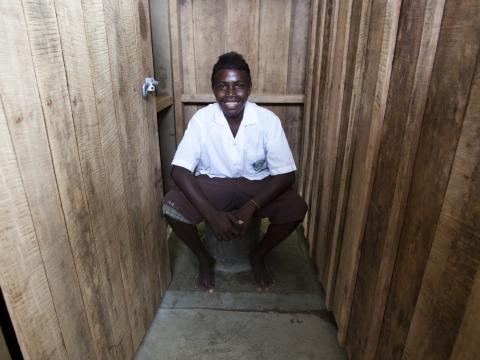Communities making sanitation a priority

More than half the people in the Solomon Islands don’t t have access to a safe toilet or latrine but World Vision is using an innovative approach to end the unsafe practice of open defecation.
Community Led Total Sanitation (CLTS) facilitates communities to understand and appreciate the link between open defecation and contamination of drinking water and food as well as health impacts like diarrhea and skin and eye infections.
A recent survey undertaken by World Vision indicates that 1 out of 5 children under the age of five have had skin or eye infections in the previous two weeks due to poor hygiene practices.
By using the CLTS approach, World Vision hopes to change these staggering statistics.
Communities have begun to see the positive impact from CLTS workshops held in settlements around Honiara, the capital of the Solomon Islands, with many communities starting to build toilets and latrines within 24 hours of the workshop.
One group of primary students from Sali Community decided to take immediate action after the CLTS workshop and constructed their own toilet. Grade 6 student Erolson Kennedy said students need to take action themselves.
“I think you should tell other students to act on what you tell them straight away. They should not wait for parents to help them. We started these [toilets] ourselves and now we have finished this toilet,” he said.
Dr. Kamal Kar, founder of the Community Led Total Sanitation (CLTS) foundation, was invited to conduct CLTS workshop to support the elimination of open defecation in communities in the Solomon Islands.
The workshops were the first of its kind in the Pacific to use CLTS methodologies with the aim to increase people’s understanding of how poor sanitation can significantly affect their health, education and financial wellbeing and to prompt them to take action and create change.
Youth and children also participated in CLTS workshops and have learnt how disease can be spread from open defecation practices. Following the workshops they have called on their parents to ensure they have a safe, clean, healthy community to grow up in.
UNICEF, World Vision and the Rural Water Supply and Sanitation department of the Ministry of Health and Medical Services supported Dr Kar’s visit to the Solomon Islands with the hope that workshops can be held throughout the Solomon Islands and lead to improved health and wellbeing of Solomon Islanders.
At the conclusion of the CLTS workshop Government and NGOs came together and discussed and developed an Action Plan for achieving an open defecation free Solomon Islands by 2015.